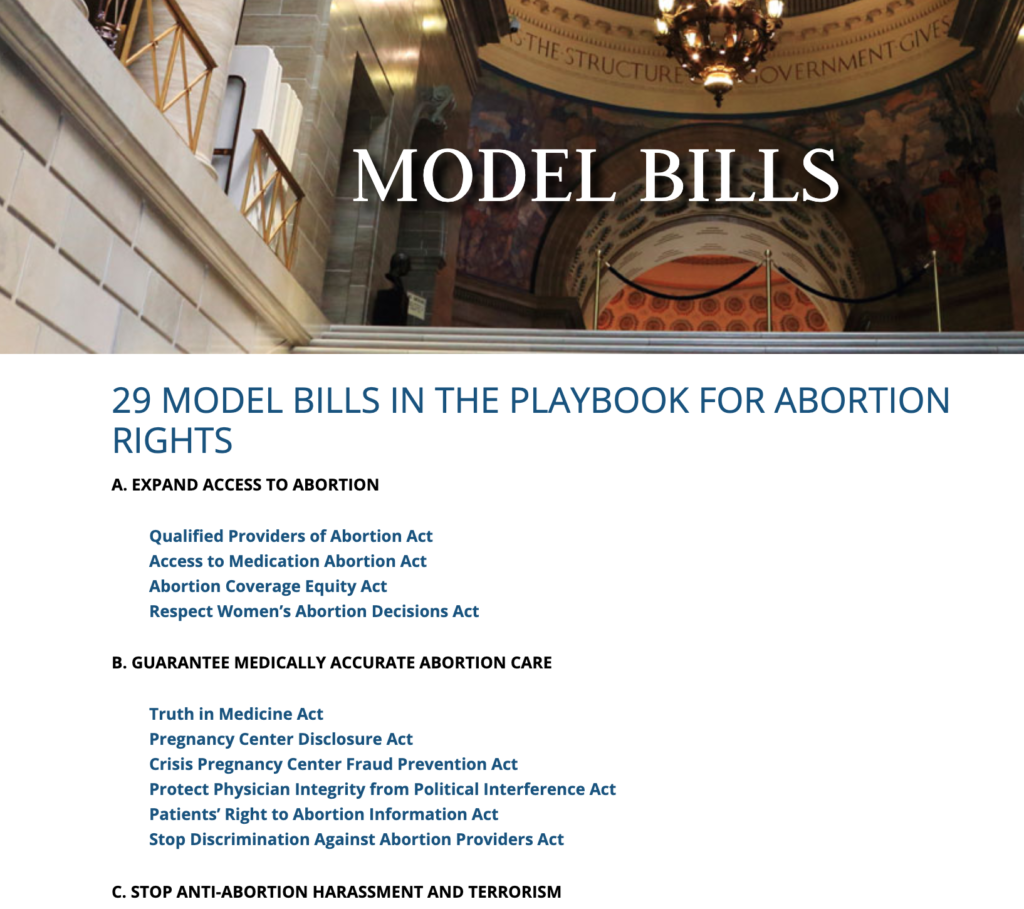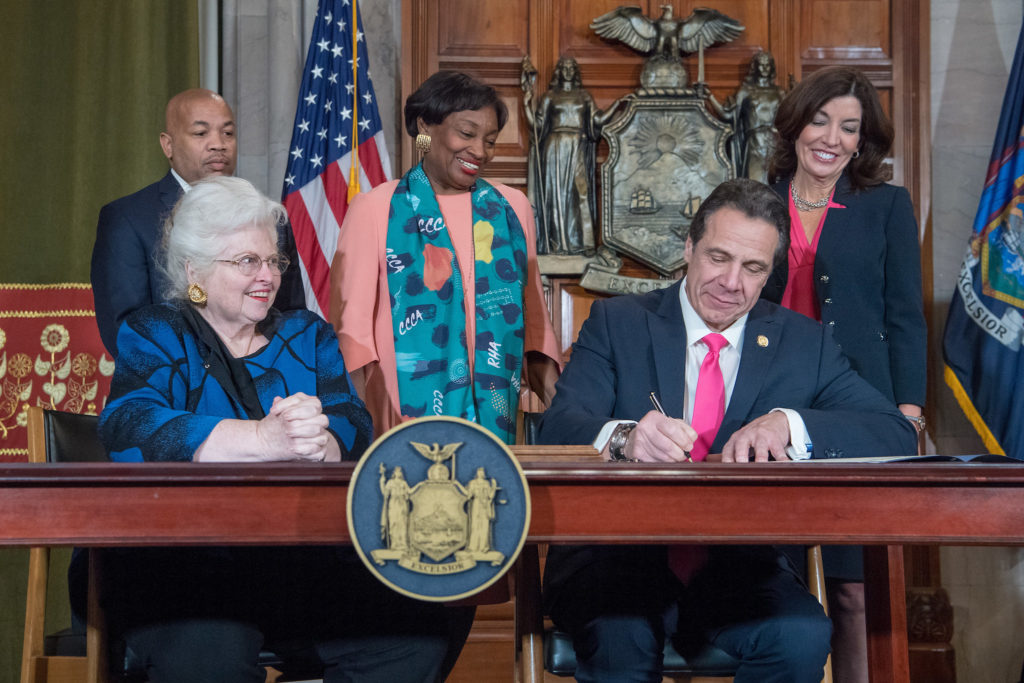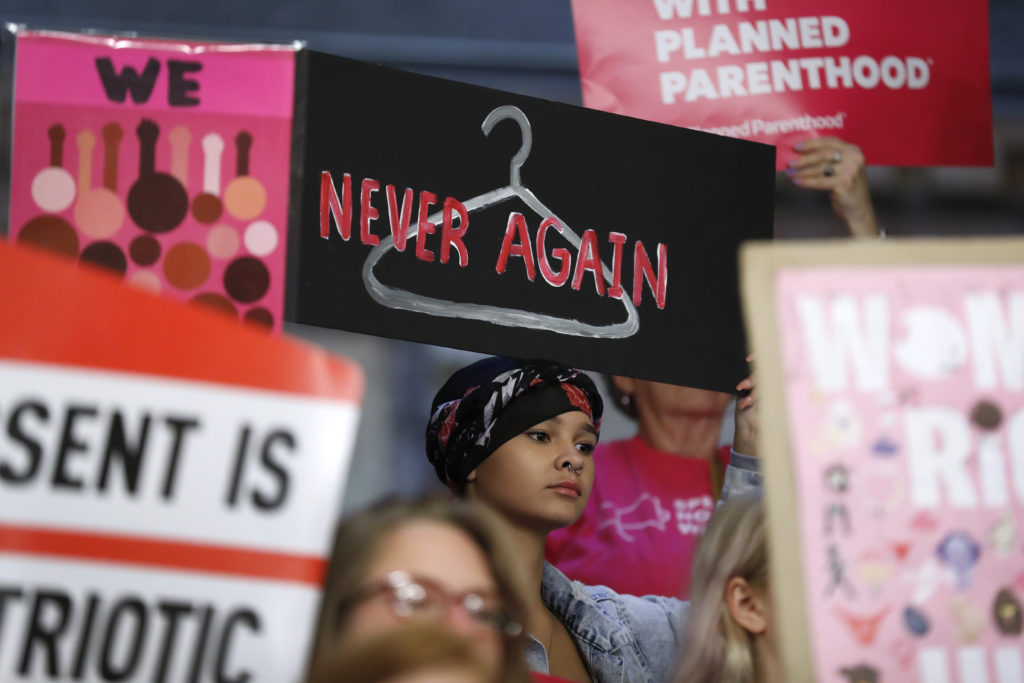This story was published in partnership with USA TODAY.
Introduction
In the raging legislative battle over women’s reproductive rights, anti-abortion state lawmakers and their allies have been on a roll.
The inventory of recent victories is impressive. In late April, Indiana lawmakers banned “dilation and evacuation” procedures, the most common type of second-trimester abortion. Two weeks later, within days of each other, Georgia and Missouri passed so-called “fetal heartbeat” bills that ban abortion as early as six weeks into pregnancy, and Louisiana soon followed suit. In mid-May, Alabama upped the ante, enacting the strictest anti-abortion law in the country — one that places a near-total ban on the procedure.
At the root of many of these anti-abortion laws is what’s known as “model legislation” — copycat bills drafted by anti-abortion groups and handed out to friendly lawmakers to introduce state by state. But anti-abortion bills aren’t the only ones making waves in this year’s legislative sessions. Also in the mix are hundreds of bills aimed at strengthening women’s reproductive rights — a far cry from four years ago, when fewer than two dozen abortion-rights bills were introduced.
The proliferation of reproductive-rights bills comes as a result of a strategic shift: Women’s rights advocates are going on offense in their legislative agenda — instead of mobilizing only in reaction to an onslaught of anti-abortion bills, as they often did in the past.
A key feature of this new strategy: Women’s rights advocates are taking a page out of anti-abortion groups’ decades-old playbook and pushing their own model legislation.
This front-line battle is part of a larger phenomenon of model legislation that’s sweeping through the halls of state capitols across the country. During a two-year investigation, the Center for Public Integrity, USA TODAY and The Arizona Republic found thousands of similar pieces of legislation on an array of issues — from auto safety and workers’ rights to gun control and welfare reform.
But the balance of power in the battle over women’s reproductive rights still appears to be on the side of anti-abortion groups, whose model legislation continues to find success this year. So far, as many states wrap up their legislative sessions, 30 anti-abortion bills — all but one of them based on model legislation — have been enacted, according to the Guttmacher Institute, a research organization that supports abortion rights.
Still, the numbers also underscore how women’s rights groups have aggressively joined the fray. More than 140 abortion-rights bills have been introduced in 28 states in this year’s legislative sessions, and eight measures with provisions similar to model legislation have been enacted or are waiting the governor’s signature.
In many ways, the use of model legislation by women’s rights groups has helped reshape the contour of the abortion debate, deepening the divide between progressive and conservative states as they push to adopt widely divergent policies and jockey for legal position in the event that the landmark Roe v. Wade decision is overturned by the U.S. Supreme Court.
A new approach
The group leading the women’s rights counterattack is the Public Leadership Institute, a Washington, D.C.-based nonprofit that has developed a 190-page handbook, “A Playbook for Abortion Rights,” that contains 29 model bills.
The handbook, first released in 2015, has policy goals that run the women’s rights gamut — from stopping anti-abortion harassment and ensuring insurance coverage for abortion to codifying women’s reproductive rights in state laws and repealing decades-old statutes criminalizing abortion to protect women’s reproductive rights.
“The Playbook is a way to really show people that we’re not going to take it anymore — we’re not going to stay on defense,” said Gloria Totten, president of the Public Leadership Institute. “We are going to affirm women’s right to abortion, no matter what the other side puts into the legislative mix.”
“The Playbook is a way to really show people that we’re not going to take it anymore — we’re not going to stay on defense.”
Gloria Totten, president of the Public Leadership Institute
Following the handbook’s release, the number of abortion-rights measures introduced in statehouses nationwide nearly quadrupled, from 22 in 2015 to 81 in 2016, and then shot up to 133 in 2017 and 146 this year, according to the Public Leadership Institute.
Totten is quick to point out that not all bills were based on the handbook. Still, the Public Leadership Institute has had a hand in many — including more than 100 of the measures introduced in 2017 — by providing assistance to lawmakers and local women’s rights groups. An analysis by the Center for Public Integrity‘s computerized bill tracker found that nearly two-thirds of the abortion-rights measures introduced this year also contained provisions similar to model legislation.
“We’ve been able to create a sense within the reproductive-rights movement that they needed to be proactive,” Totten said. “But there is still a lot of cleanup and a lot of work that needs to be done in the states in order to make sure that women actually have access to abortion.”
Beginnings
Prior to founding the Public Leadership Institute in 2015, Totten spent 14 years running Progressive Majority, a PAC that recruited and trained progressive candidates for state and local offices. What she learned there, she says, was that progressive lawmakers often lacked a coherent legislative agenda.
“We were electing progressives into office — but, once there, they would say, ‘What’s the agenda? What are we going to do?'” Totten said. “Meanwhile, the other side was like a firehose, throwing things out to them, so they were constantly on the defense.”
That’s the problem Totten set out to solve at the Public Leadership Institute — and tackling the women’s rights issue was at the top of her agenda.
But Totten and her colleagues discovered that, when they reached out to nearly two dozen like-minded women’s rights groups to solicit ideas, some didn’t think the handbook was a good idea.
“There was a real genuine fear that, if we put things out there, we create openings for them to do more bad stuff that has a real tangible impact on women’s lives,” Totten said.
Totten and her colleagues still plowed ahead and eventually settled on 29 model bills. Totten then sought input from Michigan state Rep. Rebekah Warren, a Democrat, who used to head abortion-rights group NARAL Pro-Choice Michigan.

Warren proofread the handbook and gave her feedback: Its language needed to be more inclusive and frame the issue more broadly. “We should be making the lens a little bit bigger — to be about women’s health care broadly, so that we could get more bipartisan support,” she said.
After incorporating Warren’s input, the Public Leadership Institute released the final version of the handbook in December 2015 and has since distributed nearly 5,000 hard copies to state and local lawmakers.
The Public Leadership Institute has also been offering a menu of support to lawmakers and local women’s rights groups, such as providing advocacy training and talking points, as well as conducting legislative analysis to see which model bill might be the right fit for a given state.
To sustain its work, the Public Leadership Institute now raises about $1.4 million a year in foundation grants and contributions — including from members of the Democracy Alliance, a liberal collective founded by wealthy funders like George Soros and Tom Steyer.
Warren said the reaction to the handbook was decidedly positive among her like-minded Michigan colleagues, so much so that she helped orchestrate a simultaneous introduction of 10 bills — all inspired by the handbook — in 2017. In the end, the bills failed to get any traction in the state’s Republican-controlled legislature, but Warren said taking such a proactive step was cathartic.
“After so many years of playing defense, it was very empowering as a pro-choice caucus in the Michigan Legislature to say, ‘This is our line in the sand. We’re done playing defense. It’s time to play offense, to be unapologetic about what we care about,'” Warren said.
The handbook has found champions even in some deep-red states.
This year, for instance, Texas state Rep. Jon Rosenthal, a Democrat, sponsored a measure based on a model bill, “Keep Bosses Out of the Bedroom Act,” that would prohibit discrimination against employees based on their reproductive health decisions.
Though Rosenthal’s bill eventually stalled, Aimee Arrambide, executive director of NARAL Pro-Choice Texas, said it got an important hearing. “We didn’t win in a traditional sense, but it allowed us to have a venue to testify. That’s a small win,” she said.
Totten added that, in states controlled by conservatives, “you might as well put your boldest idea forward because then at least you’re creating a North Star that other people can kind of drive toward.”
But the handbook did lead to some notable successes elsewhere, mostly in Democrat-controlled legislatures.
In 2017, for instance, Oregon enacted the Reproductive Health Equity Act — based on a model bill, “Abortion Coverage Equity Act” — that requires health insurance to cover abortion and other reproductive health services at no cost to patients.
In January, New York grabbed national headlines when it enacted a law that repealed statutes criminalizing abortion and allowed the procedure to be performed in later stages of pregnancy. Totten said the Public Leadership Institute didn’t work directly with New York lawmakers on the bill, but the measure incorporated some language from a model bill, “Respect Women’s Abortion Decisions Act.”
In May, the Vermont General Assembly also passed a bill similar to the same model bill, prohibiting the state government from interfering with women’s right to abortion.

An uphill battle
Despite the handbook’s success, women’s rights advocates are still nowhere near matching the victories that anti-abortion groups have had in pushing their agenda. Since 2017, anti-abortion lawmakers have adopted nearly 100 bills, according to the Guttmacher Institute.
Some anti-abortion groups — such as Americans United for Life, National Right to Life and the Susan B. Anthony List — have been refining their model bills over decades of work. For instance, National Right to Life, which operated on an annual budget of $3.6 million in 2018, began drafting model bills in 1980s and now has 35 measures, including the “Pain-Capable Unborn Child Protection Act” that bans abortion after 20 weeks into pregnancy.
Until recently, National Right to Life and its allies mostly favored an incremental approach, pushing model bills that would chip away at Roe v. Wade.
This approach has resulted in an array of laws that set up roadblocks to abortion, such as regulations that result in clinic closures, mandatory waiting periods and counseling, and requirement for minors to receive consent from a parent or legal guardian.
But calls for more drastic moves to further restrict abortion began to mount last year, when conservatives gained a majority on the U.S. Supreme Court.
“With the shift on the Supreme Court, there’s more openness to banning abortion altogether,” said Elisabeth Nash, senior state issues manager at the Guttmacher Institute. “States are clearly more confident now that they think they can prevail in the courts.”
A case in point: Before Georgia, Louisiana and Missouri, six states had already passed “fetal heartbeat” bills, which are based on a model bill drafted by an Ohio-based anti-abortion group, Faith2Action.
Faith2Action’s model bill mandates doctors to use “standard medical practice” to check for a fetal heartbeat. It then bans abortion if a heartbeat is present, unless it’s necessary to save the mother’s life. But it provides no exception for rape or incest.
The first “fetal heartbeat” bill surfaced in Ohio in 2011, but anti-abortion group Ohio Right to Life stayed “neutral” on the measure, and it eventually stalled.
That changed last year. Ohio Right to Life came out in support, and the bill sailed through the Ohio Legislature in December.
“From our perspective, the Supreme Court was just not ready for the ‘heartbeat’ bill for a long time,” said Ohio Right to Life spokeswoman Jamieson Gordon said. “But we felt that’s changed with the advent of a new Supreme Court, with Justices Kavanaugh and Gorsuch on the bench.”
Janet Porter, president of Faith2Action, did not respond to requests for comment. But she told The Guardian newspaper in April: “[This is] an easy thing for the Supreme Court to embrace. … All they have to do is move the marker from the unscientific marker to the scientific marker of heartbeat, which is inches away from our goal of when our lives begin at conception.”
Meanwhile, in Alabama, anti-abortion lawmakers were intent on going further. But no model bills were radical enough for them, so they had the Alabama Pro-Life Coalition draft a bill that they hope would mount a direct challenge to Roe v. Wade.
The result: a bill that would establish criminal penalties of up to 99 years in prison for doctors performing abortion at any stage, with the only exception being a threat to the mother’s life. On May 15, Alabama’s Republican Gov. Kay Ivey signed it into law under heavy criticism, even from some leaders in the anti-abortion movement.
On the Christian Broadcasting Network, conservative televangelist Pat Robertson told his audience that Alabama’s law “has gone too far.”
“It’s an extreme law,” Robertson said. “They want to challenge Roe v. Wade, but my humble view is that this is not the case that we want to bring to the Supreme Court, because I think this will lose.”
Ingrid Duran, director of state legislation at National Right to Life, shared the concern. “If there is an unfavorable Supreme Court decision that reasserts that unborn children don’t have a right, that could potentially be a setback to the pro-life movement,” she said.

High-court caution
A long line of anti-abortion laws are already in various stages of judicial review and have the potential to reach the Supreme Court, even before Alabama’s law faces the first legal challenge.
Some cases have already been appealed to the Supreme Court, including one involving a Louisiana law that requires doctors who perform abortion to have admitting privileges at a hospital within 30 miles of their offices. In February, the high court temporarily stayed the Louisiana law, which women’s rights advocates say would leave the state with only one doctor qualified to perform abortion.
For now, at least, women’s rights advocates can take comfort in the fact that the Supreme Court, in general, prefers a gradual approach to shifting the court’s jurisprudence, said Mary Ziegler, a law professor at the Florida State College of Law.
“Getting rid of a precedent as controversial and well-known as Roe is usually something that would take the court a long time, even if the court has a solidly conservative majority,” said Ziegler, author of “Beyond Abortion: Roe v. Wade and the Battle for Privacy.”
But an ominous sign emerged in May, when the Supreme Court’s conservative majority overturned a 40-year-old precedent. The case had nothing to do with abortion: whether an individual should be allowed to sue a state in the courts of another state. But Justice Stephen Breyer used his dissent to issue a warning about potential judicial challenges to Roe v. Wade.
Breyer warned that the ruling in Franchise Tax Board of California v. Hyatt was a departure from stare decisis, a legal doctrine in which courts are to abide by precedents unless there’s a compelling reason to overrule them.
It is “dangerous to overrule a decision only because five Members of a later Court come to agree with earlier dissenters on a difficult legal question,” Breyer wrote. “Today’s decision can only cause one to wonder which cases the Court will overrule next.”
Rachel Sussman, national director of state policy and advocacy at Planned Parenthood Federation of America, said all this underscores why women’s rights advocates will have to keep fighting at the state level.
“In a world where Roe might be overturned,” Sussman said, “we need very concrete and real plans to push and change policy in states.”


Join the conversation
Show Comments
Within the opening remarks of this article I asked myself “is there any way for the consumer to know if there is a recall on their vehicle on their own?” Not wanting myself to be in a situation where I could have protected myself from severe harm or death. The answer is yes – all you need to do is go to safercar.gov and type in the VIN number to see what, if any, recalls are on a specific car. Consumers can, quite easily, protect themselves without relying on the dealers ethics. This should have been mentioned in the article.… Read more »